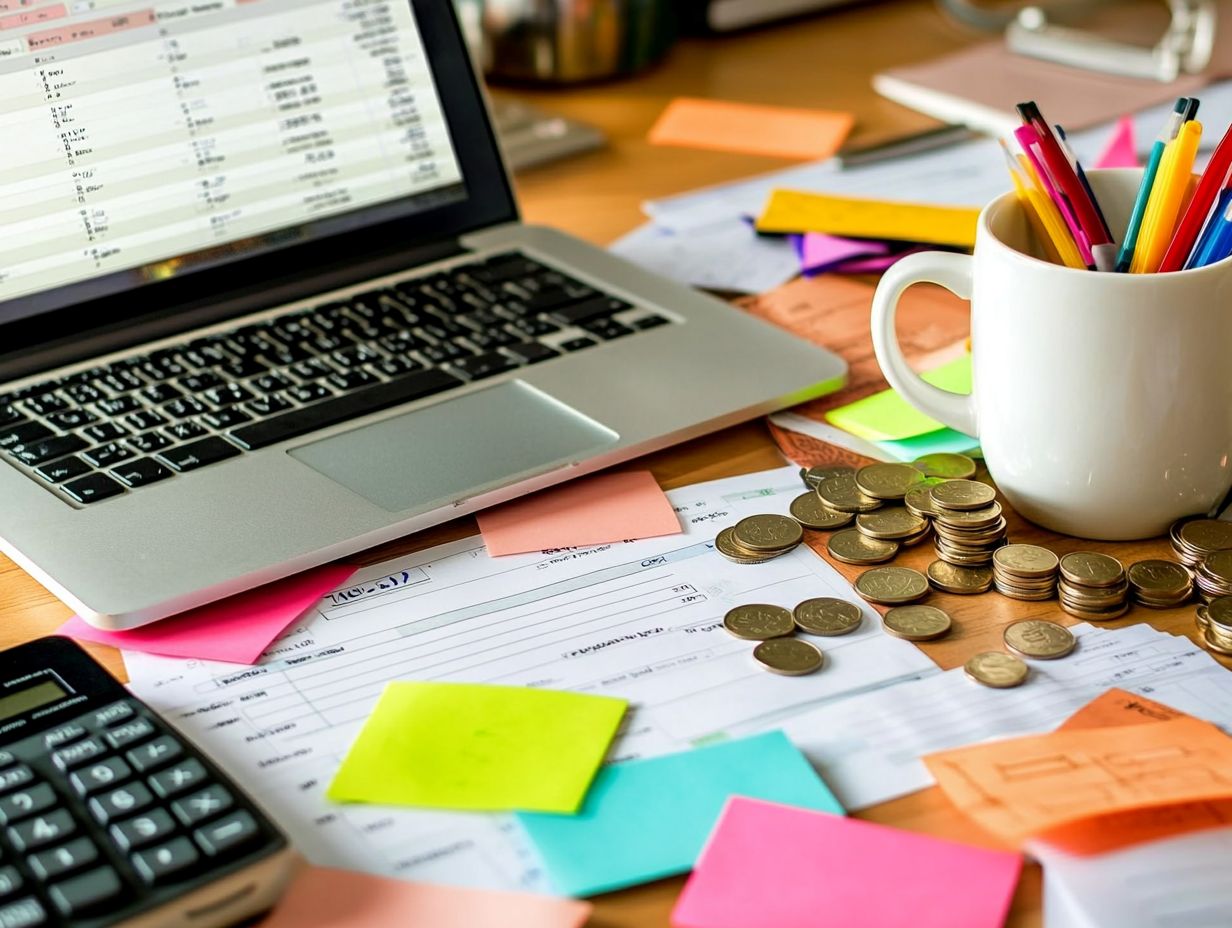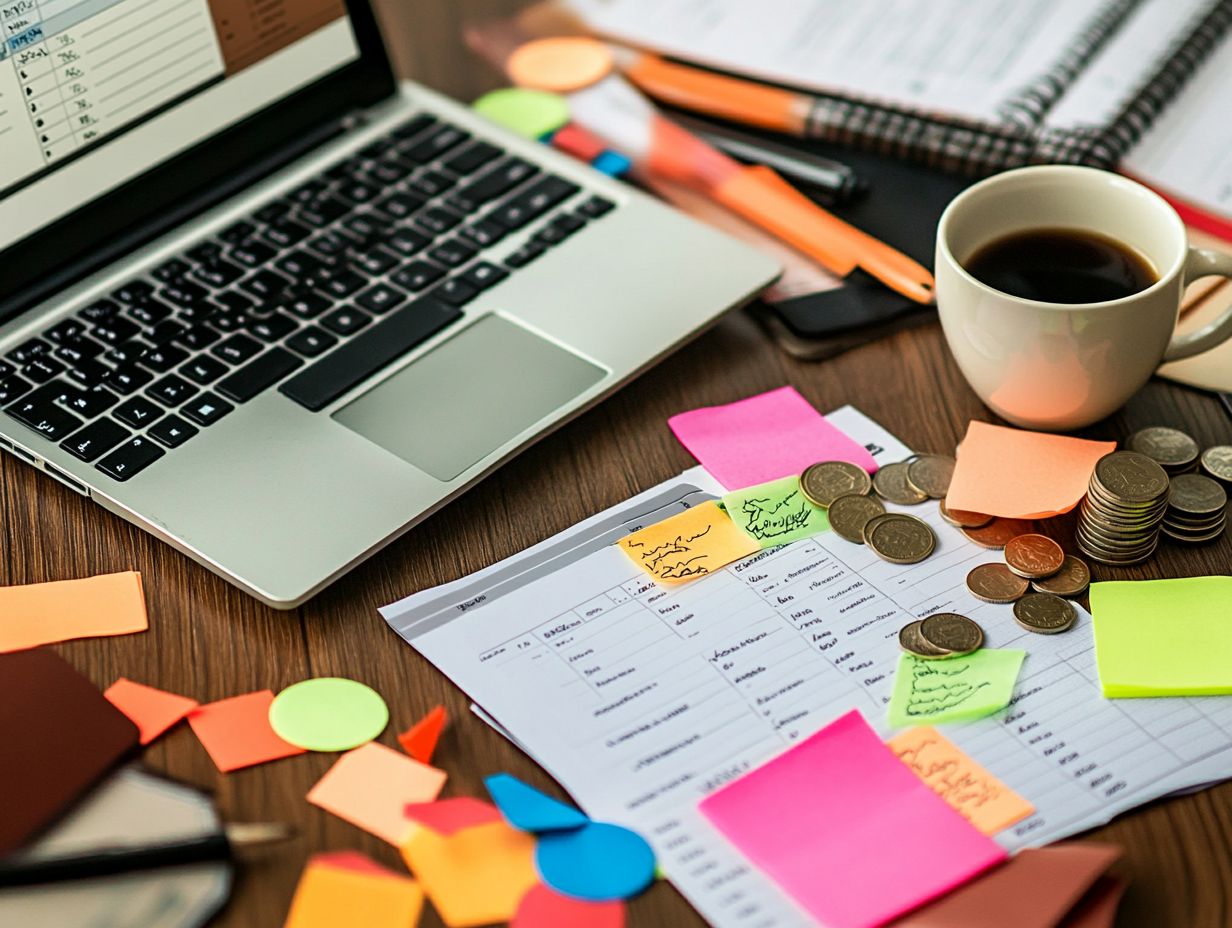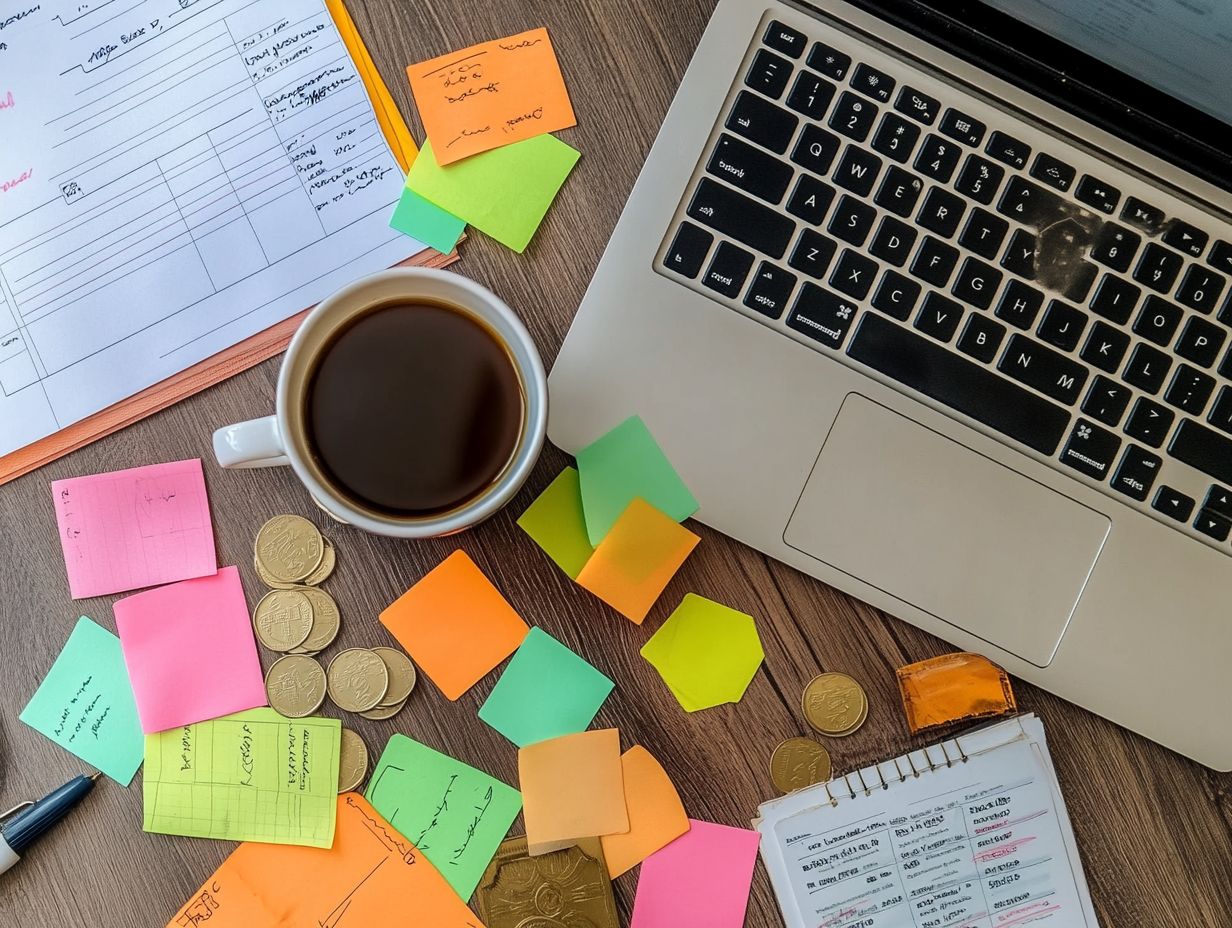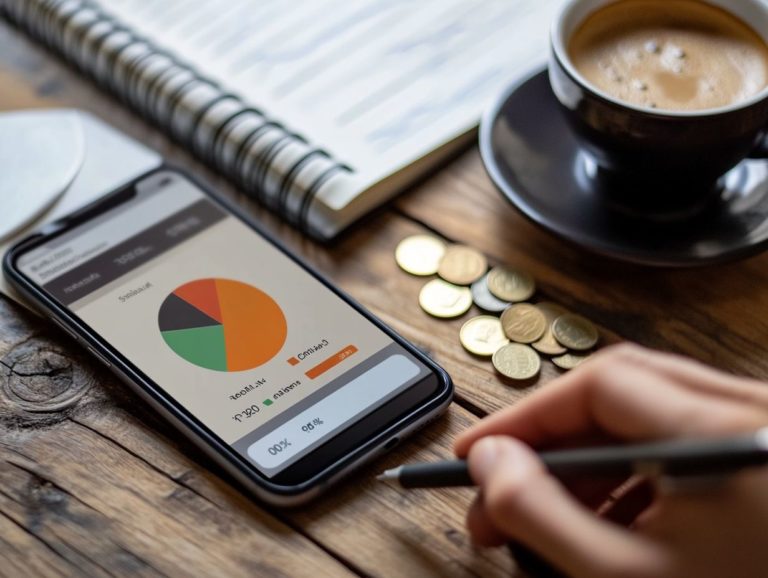What Should I Include in My Budget?
Budgeting is an essential skill that puts you in the driver s seat of your finances. It ensures your money works for you instead of against you.
This article covers the basics of budgeting. You’ll learn what a budget is and why it’s important.
You will also find key components of a strong budget, including income, expenses, and savings. This guide offers practical tips to help you create a realistic budget and stay on track.
Are you ready to take charge of your financial future? Let s jump in!
Contents
Key Takeaways:

- A budget is a plan for managing your money, including your income, expenses, and savings.
- Budgeting is important because it helps you achieve financial goals, avoid debt, and understand your finances clearly.
- When creating a budget, consider your income, expenses, and savings goals. Regularly track your spending to make necessary adjustments.
Understanding Budgeting
Understanding budgeting is an invaluable skill. It empowers you to manage your finances wisely.
This knowledge helps you allocate your monthly expenses across different categories, from housing to transportation costs. It’s about keeping track of regular expenses like rent and insurance, while also managing optional spending like groceries and entertainment.
By mastering this skill, you can develop a healthier financial lifestyle. It prioritizes savings and reduces debt, setting you on the path to financial wellness.
What is a Budget?
A budget is your detailed financial blueprint. It maps out your expected income and expenses over a specific period, usually monthly.
This essential tool helps you manage your finances and breaks down components like income sources salaries, freelance gigs, or passive income as well as regular and optional expenses including rent, utilities, and entertainment.
Budgeting helps set aside savings for emergencies or future investments. Craft a personalized roadmap that guides you toward achieving your financial goals, whether you’re a student, a young professional, or planning for retirement.
Why is Budgeting Important?
Budgeting serves as your roadmap to achieving financial goals. It allows you to distinguish between necessary expenses and optional spending within your monthly budget.
With a detailed budget, prioritize your spending effectively. Address vital bills like housing and utilities first, then allocate funds for long-term aspirations like an emergency fund or retirement savings.
For example, setting aside a modest amount each month for emergencies can create a safety net for unexpected expenses, relieving financial stress.
Regular contributions to a retirement fund can yield significant growth over time, thanks to compound interest. Practical strategies like using budgeting apps or tracking expenses with spreadsheets provide a clear picture of your financial health.
These disciplined habits pave the way for lasting stability and your success.
Essential Components of a Budget
Your budget should encompass income sources, various expenses, and strategies for savings and investments that align with your financial objectives.
Income

Income includes all the sources of money flowing into your budget, from wages and bonuses to side gig earnings and passive income streams.
Understanding the different types of income is vital for anyone aiming to create a well-rounded budget. Your regular wages might increase from seasonal bonuses, freelance projects, or even royalties.
Passive income, like rental earnings or dividends from your investments, significantly improves your financial security. Calculate your total monthly income by including all these earnings and noting any fluctuations.
This estimation is essential. It directly impacts how you spend your money and influences your saving strategies, debt management, and overall financial wellbeing.
Expenses
Expenses represent the outflows of your hard-earned money and can be divided into fixed and variable types.
Think of fixed expenses as the steady companions in your financial journey, like housing costs and insurance premiums. Understanding these types is crucial for crafting a solid budget plan.
Fixed expenses create a stable groundwork, allowing you to easily predict necessary payments like rent or mortgage. In contrast, variable expenses, like dining out and travel, can fluctuate and need your careful attention to avoid overspending.
By tracking these monthly expenditures, you’ll easily adjust your spending habits. This approach prioritizes savings and empowers you to make informed financial decisions.
Savings and Investments
Savings and investments are key to your budget. They help you build an emergency fund and contribute to retirement savings.
Allocating a specific portion of your budget for savings fosters financial stability. Try automating transfers to a savings account to simplify tracking your progress.
Establishing an emergency fund provides a crucial safety net for unexpected expenses, reducing financial vulnerability. For retirement, look into options like 401(k) plans or IRAs to enhance your future financial outlook.
These practices enable you to navigate life s uncertainties with greater confidence and clarity.
Creating a Realistic Budget
Creating a realistic budget involves setting clear financial goals and tracking your spending habits. Make necessary adjustments to stay aligned with your monthly budget.
This method helps you manage your finances effectively and paves the way for achieving your financial aspirations.
Assessing Your Financial Goals
Assessing your financial goals is the crucial first step in crafting a realistic budget. It helps you prioritize savings and tackle any existing debt.
When identifying these goals, think about your short-term aspirations like saving for a vacation or building an emergency fund and your long-term objectives, such as retirement or purchasing a home. A clear understanding enables you to budget effectively and secure your future stability.
Once you’ve established your priorities, align them with your monthly expenses. This alignment can greatly influence your spending habits.
By practicing disciplined budgeting, you can track your progress and pave the way toward financial freedom.
Tracking Your Spending

Tracking your spending is crucial for understanding how your monthly expenses align with your budget categories. This ensures you stay on course with your financial plan.
By utilizing various tools whether it’s budgeting apps or straightforward spreadsheets you can gather valuable insights into your financial habits. These methods offer a clear visual representation of where your money is flowing, making it simpler to spot unnecessary expenditures.
Regularly reviewing your spending patterns allows you to identify trends, empowering you to make adjustments when necessary. By taking these steps, you can master your finances, stay within your designated budget, and pursue your long-term financial goals with newfound ease.
Making Adjustments
Adjusting your budget is an essential practice that empowers you to adapt to changes in income or expenses while steadfastly pursuing your financial goals.
Life is unpredictable, and you will face expected and unexpected financial challenges. To navigate these changes effectively, it’s crucial to regularly review your financial situation and assess where adjustments are needed. This may involve shifting money from non-essential expenses or seeking new income sources during a job transition.
A monthly review can show you patterns that need adjustments, ensuring your budget remains aligned with both your short-term needs and long-term aspirations. Flexibility is key, allowing you to take a proactive approach to managing your finances without unnecessary stress, which is essential for achieving sustainable financial health.
Tips for Sticking to Your Budget
Act now to establish clear priorities, exercise discipline, and build sound financial habits. This approach will pave the way for long-term success in managing your monthly expenses effectively.
Setting Priorities
Setting priorities in your budgeting journey is essential. It enables you to allocate resources effectively across various categories while ensuring alignment with your financial aspirations.
By identifying high-priority expenses think housing, utilities, and essential groceries you ensure that your basic needs are met before entertaining discretionary spending like dining out or entertainment. Distinguishing between these expense types allows you to create a more accurate and effective budget.
For instance, you might start by listing your monthly bills and then allocate any leftover funds toward savings or leisure activities. This smart approach helps you use your funds wisely and boosts your chances of achieving long-term financial goals, such as saving for a home or planning for retirement. With a clear focus on necessary expenditures, your path to financial security becomes much more defined.
Practicing Discipline
Practicing discipline in your spending habits is essential for adhering to your budget and staying committed to your financial goals.
Whether you’re saving for that dream vacation or planning a home renovation, maintaining a financial plan requires constant diligence. A powerful technique to cultivate this discipline is to create a list of priorities before making any purchases, ensuring that each expense aligns with your overarching objectives.
For instance, setting strict spending limits on discretionary categories like entertainment or dining out can be a game changer in minimizing impulse purchases. Implementing strategies like the 24-hour rule, where you wait a full day before deciding to buy a non-essential item, can drastically reduce those impulsive decisions.
This approach illustrates how thoughtful budgeting not only protects your savings but also nurtures a healthier financial mindset.
Frequently Asked Questions

What should I include in my budget?
Your budget should include all sources of income and all expenses. This includes fixed expenses like rent and utilities, variable expenses like groceries and entertainment, as well as any savings or debt payments money you owe, like credit card bills or loans.
Do I need to include every single expense in my budget?
It’s best to include as many expenses as you can in your budget. Prioritize the most important ones, but be ready for surprises in costs.
How detailed should my budget be?
Your budget can be as detailed as you want. A detailed budget helps you understand your finances better, allowing you to track categories like food or transportation.
Should I include a savings category in my budget?
Absolutely! Prioritize saving for emergencies and future goals. Aim to save at least 10-15% of your income monthly.
Can I make changes to my budget?
Yes! Your budget should be flexible. Adjust it as necessary based on your current financial situation.
Why is it important to review and update my budget regularly?
Regularly reviewing your budget helps you track spending, spot areas to improve, and adjust as needed. Staying updated keeps you on track with your financial goals.






